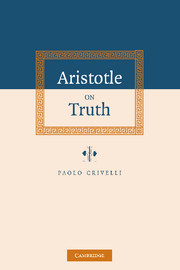Book contents
- Frontmatter
- Contents
- Acknowledgements
- Notes on the text
- List of abbreviations of titles of Aristotle's works
- Introduction
- Part I BEARERS OF TRUTH OR FALSEHOOD
- Part II ‘EMPTY’ TERMS
- Part III TRUTH AND TIME
- Appendix 1 Metaph. Θ 10, 1051b1: the text
- Appendix 2 Metaph. Θ 10, 1051b2–3: the text
- Appendix 3 Int. 7, 17b16–18: the text
- Appendix 4 The two-place relations in Aristotle's definition of truth
- Appendix 5 Aristotle's theory of truth for predicative assertions: formal presentation
- Appendix 6 The failure of bivalence for future-tense assertions: formal presentation
- References
- Index of names
- Index of subjects
- Index of passages
Appendix 4 - The two-place relations in Aristotle's definition of truth
Published online by Cambridge University Press: 22 September 2009
- Frontmatter
- Contents
- Acknowledgements
- Notes on the text
- List of abbreviations of titles of Aristotle's works
- Introduction
- Part I BEARERS OF TRUTH OR FALSEHOOD
- Part II ‘EMPTY’ TERMS
- Part III TRUTH AND TIME
- Appendix 1 Metaph. Θ 10, 1051b1: the text
- Appendix 2 Metaph. Θ 10, 1051b2–3: the text
- Appendix 3 Int. 7, 17b16–18: the text
- Appendix 4 The two-place relations in Aristotle's definition of truth
- Appendix 5 Aristotle's theory of truth for predicative assertions: formal presentation
- Appendix 6 The failure of bivalence for future-tense assertions: formal presentation
- References
- Index of names
- Index of subjects
- Index of passages
Summary
The two-place relations involved in the truth conditions for quantified assertions. An important feature of [17], the definition of truth for predicative assertions I attribute to Aristotle, is that the truth conditions for (those utterances which are) quantified predicative assertions involve two-place relations (the combination of universally holding, the division of universally failing to hold, the combination of not universally failing to hold, and the division of not universally holding) obtaining between the universals signified by the predicates and the subjects of the assertions. These two-place relations are to some extent reflected in views formulated in the logical writings of Aristotle himself and of some of his pupils.
The expression ‘to hold universally’. In some passages Aristotle uses the expression ‘to hold universally’ (‘καθόλου ὑπάρχειν’) to express a relation which is at least close to the combination of universally holding. This fits well with the part of [17] which concerns universal affirmative predicative assertions.
Universal affirmative predicative assertions and being a part of a whole. At the beginning of the Prior Analytics Aristotle says that he intends to determine ‘what it is for this to be, or not to be, in this taken as a whole [ἐν ὅλῳ εἶναι ἢ μὴ εἶναι τόδ∊ τῷδε]’ (1.1, 24a13–14). Aristotle probably wants to describe what universal affirmations and denials say.
- Type
- Chapter
- Information
- Aristotle on Truth , pp. 254 - 257Publisher: Cambridge University PressPrint publication year: 2004



